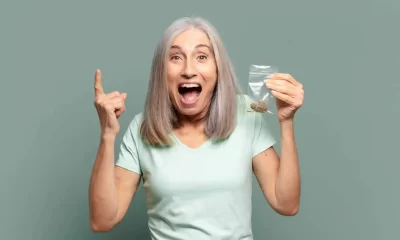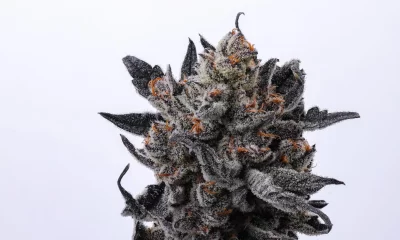Business
Jamaica Rises with the Help of Kaya Herb House’s Bali Vaswani

Kaya Herb House is the first medical cannabis dispensary in the Caribbean.
Though cannabis has been common in Jamaica for a long time, Kaya Herb House was the first regulated medical cannabis dispensary to open in not only Jamaica, but the Caribbean—stocked with its own flower and concentrates.
It’s thanks to Jamaica’s transformation on cannabis reform that can be seen by the swift changes in law over the past several years.
In February 24, 2015, the Parliament of Jamaica voted to drastically amend the nation’s cannabis laws—making possession of up to two ounces a petty offense, establishing a licensing authority and a medical cannabis system. Cultivation of five or fewer plants is permitted, and practitioners of Rastafari can use cannabis for religious purposes—the first country to officially recognize the use of cannabis for that reason.
It was historic in that Rastafarians have fought in vain for the religious right to smoke herb for decades—one example being when former Attorney General Janet Reno denied American Rastafarians the right to do so in 1998.

The new amendments to law enable the company to thrive. Kaya Herb House’s sister companies Kaya Farms, Kaya Spa, Kaya Café, and Kaya Tours are a testament to how much the company has expanded—both vertically and geographically.
Kaya Farms announced its first legal harvest on February 20, 2018, grown at Drax Hall, St Ann, to be sold at Kaya Herb House. (Timeless Herbal Care also competed for that title, releasing a harvest during the same time period.) Kaya Herb House has been both a leader in high quality cannabis on the island as well as a prime source of education on the plant.
Balram “Bali” Vaswani is Kaya Herb House’s Chief Ganja Officer, born in Jamaica and witness early on to legendary strains dating back to the 1970s, such as Lamb’s Bread.
His team follows the strict rules of Jamaica’s Cannabis Licensing Authority (CLA), and was actually subject to a random check-up during our call. But he says the systems in U.S. states prepared him well for the regulated industry in Jamaica.
“I was in, you know, I was in Colorado from around 2011 and I got a chance to see medical move to recreational and thought it was so interesting being able to be in a place and watch it happen,” Vaswani tells High Times.
After seeing how the framework in Colorado operates, Vaswani decided to participate in the formation of the licensing process in his own country as people lobbied in Jamaica to move towards the same agenda. “Both governments in 2015 were bipartisan, meaning they both kind of approved it and it had gone to Parliament, but the law has never really changed. And there was one milestone activity,” he says.

Vaswani says all the legislative change in Jamaica was spurred by an incident—a clear-cut example of injustice—involving one young man who died in prison, over one joint.
Mario Deane was arrested in February 2014 for possession of a single spliff (joint), and was tragically beaten to death inside his cell at the Barnett Street Police Station in Montego Bay. Anyone who has been to Montego Bay, including myself, knows how common weed is there, which makes it even more angering. Police claim he was brutally beaten to death by his cellmates, Marvin Orr and Adrian Morgan, but his family and friends suspect police foul play could be the real reason.
“I believe the date was Friday, February 2, and he died in jail on Sunday—for one joint,” Vaswani laments. “And that triggered [action] because it was already in Parliament on February 5, went to Parliament immediately with the riots and stuff saying, this is ridiculous that we’re this far and we’re still, you know, still being brutalized. And coincidentally law was changed and enacted and decriminalized on February 6, 2015. And the government said ‘we’re going to issue based on the rules and the regulations of anybody under the U.N. treaty that we’re going to decriminalize and allow for research and development until we formed laws of what the cannabis license authority would do’.”
Vaswani was one of the first to get in early in the program, beating the odds. In 2015, he launched Ganja Labs LLC, which grew legal cannabis at the University of Technology, Jamaica in Kingston, under the UTech medical cannabis research license granted by Minister of Science, Energy and Technology Dr. Andrew Wheatley.
“I was lucky enough to get one, the exclusive one with the University of Technology, [Jamaica] in 2015. So we got that in May, 2015 and we broke ground in November,” he says. “And then we had the first harvest or legal harvest in Jamaica in 2016, but only for research and development.”
In 2016, Vaswani told Rolling Stone about how he shared the first harvest with longtime friend Rohan Marley, son of Bob Marley. The two have put their minds together on several business pursuits.
The change in laws was a significant time because they could get genetics, the software, and they could train people how to clone plants. Vaswani said that there’s a learning curve in a regulated industry, and you realize how much you have to do on a daily basis.
On March 10th, 2018—representing the first legal sale in the Caribbean—Bali recalls as many as 5,000 people lining up in front of the dispensary to buy medical cannabis. He remembers celebrating because from that day, you could buy cannabis legally with a receipt, with a medical card—instead of out of a backpack from sellers on the beach, or elsewhere.

“And the only difference between the laws in the U.S. and Jamaica right now in terms of the medical side is that we don’t have edibles at all, but every other component in terms of rosin, resin, hash oils, et cetera, are all available, but just [the] ministry of health has not adopted the edibles.”
One location is in front of the cruise ship terminal about 30 or so minutes from Montego Bay. Then there’s another location two minutes away from Bob Marley’s house and across the road from T.G.I. Fridays in the heart of Kingston. In 2019, Kaya Herb House did its first export of oils, and then last year during COVID, they sent the first export of flower to Australia. “We’re not really a MSO, but we’re kind of an international company rather than a multi-state operator. And, you know, just to broaden our wings we said, ‘How can we continue to expand?’ So we launched our first franchise in December 2020 during COVID.”
Vaswani explained how they have a smoke room, and they are providing a lot of education because in Jamaica they didn’t really have the varieties of what you have in the U.S. “Our gum was finger gum that came off your finger, not really full hash, you know,” Vaswani says. “They didn’t have fresh clothes and they didn’t have kief so little by little we’ve, you know, we’ve educated a wider thing.”
The dispensary experience in his stores varied greatly from what you might see in the U.S., Vaswani says.
“In Colorado, we try to get people out between 45 seconds and a minute and a half per transaction,” he says. “Our typical transaction, our stores, for about an hour and a half they’ll come in … they’ll hit a dab, they might go for an espresso. So they might have pizza. So people might share, they might go back in and just get something else. And they’re kind of on the go. And then sometimes we see people three times a day.”
Kaya Herb House plans to build its next location in the Blue Mountain, which is four and a half thousand feet up, as their first entrance into “wellness.”
Vaswanis reminds us that psilocybin mushrooms are legal in Jamaica, and you can buy them as well.
“Our mushrooms are functional and psychoactive, you know, that would be available in our new location. Imagine looking over the city at 4,000 feet, and we have 4,000 acres surrounded by UNESCOs heritage site, you know, so it’s a protected area. So we’re, we’re, we’re gonna be inside the protected area of the forest.”
Check out what Kaya Herb House offers, especially if you plan on traveling to Jamaica.
Source: https://hightimes.com/dispensaries/jamaica-rises-with-the-help-of-kaya-herb-houses-bali-vaswani/
Business
New Mexico cannabis operator fined, loses license for alleged BioTrack fraud

New Mexico regulators fined a cannabis operator nearly $300,000 and revoked its license after the company allegedly created fake reports in the state’s traceability software.
The New Mexico Cannabis Control Division (CCD) accused marijuana manufacturer and retailer Golden Roots of 11 violations, according to Albuquerque Business First.
Golden Roots operates the The Cannabis Revolution Dispensary.
The majority of the violations are related to the Albuquerque company’s improper use of BioTrack, which has been New Mexico’s track-and-trace vendor since 2015.
The CCD alleges Golden Roots reported marijuana production only two months after it had received its vertically integrated license, according to Albuquerque Business First.
Because cannabis takes longer than two months to be cultivated, the CCD was suspicious of the report.
After inspecting the company’s premises, the CCD alleged Golden Roots reported cultivation, transportation and sales in BioTrack but wasn’t able to provide officers who inspected the site evidence that the operator was cultivating cannabis.
In April, the CCD revoked Golden Roots’ license and issued a $10,000 fine, according to the news outlet.
The company requested a hearing, which the regulator scheduled for Sept. 1.
At the hearing, the CCD testified that the company’s dried-cannabis weights in BioTrack were suspicious because they didn’t seem to accurately reflect how much weight marijuana loses as it dries.
Company employees also poorly accounted for why they were making adjustments in the system of up to 24 pounds of cannabis, making comments such as “bad” or “mistake” in the software, Albuquerque Business First reported.
Golden Roots was fined $298,972.05 – the amount regulators allege the company made selling products that weren’t properly accounted for in BioTrack.
The CCD has been cracking down on cannabis operators accused of selling products procured from out-of-state or not grown legally:
- Regulators alleged in August that Albuquerque dispensary Sawmill Sweet Leaf sold out-of-state products and didn’t have a license for extraction.
- Paradise Exotics Distro lost its license in July after regulators alleged the company sold products made in California.
Golden Roots was the first alleged rulebreaker in New Mexico to be asked to pay a large fine.
Source: https://mjbizdaily.com/new-mexico-cannabis-operator-fined-loses-license-for-alleged-biotrack-fraud/
Business
Marijuana companies suing US attorney general in federal prohibition challenge

Four marijuana companies, including a multistate operator, have filed a lawsuit against U.S. Attorney General Merrick Garland in which they allege the federal MJ prohibition under the Controlled Substances Act is no longer constitutional.
According to the complaint, filed Thursday in U.S. District Court in Massachusetts, retailer Canna Provisions, Treevit delivery service CEO Gyasi Sellers, cultivator Wiseacre Farm and MSO Verano Holdings Corp. are all harmed by “the federal government’s unconstitutional ban on cultivating, manufacturing, distributing, or possessing intrastate marijuana.”
Verano is headquartered in Chicago but has operations in Massachusetts; the other three operators are based in Massachusetts.
The lawsuit seeks a ruling that the “Controlled Substances Act is unconstitutional as applied to the intrastate cultivation, manufacture, possession, and distribution of marijuana pursuant to state law.”
The companies want the case to go before the U.S. Supreme Court.
They hired prominent law firm Boies Schiller Flexner to represent them.
The New York-based firm’s principal is David Boies, whose former clients include Microsoft, former presidential candidate Al Gore and Elizabeth Holmes’ disgraced startup Theranos.
Similar challenges to the federal Controlled Substances Act (CSA) have failed.
One such challenge led to a landmark Supreme Court decision in 2005.
In Gonzalez vs. Raich, the highest court in the United States ruled in a 6-3 decision that the commerce clause of the U.S. Constitution gave Congress the power to outlaw marijuana federally, even though state laws allow the cultivation and sale of cannabis.
In the 18 years since that ruling, 23 states and the District of Columbia have legalized adult-use marijuana and the federal government has allowed a multibillion-dollar cannabis industry to thrive.
Since both Congress and the U.S. Department of Justice, currently headed by Garland, have declined to intervene in state-licensed marijuana markets, the key facts that led to the Supreme Court’s 2005 ruling “no longer apply,” Boies said in a statement Thursday.
“The Supreme Court has since made clear that the federal government lacks the authority to regulate purely intrastate commerce,” Boies said.
“Moreover, the facts on which those precedents are based are no longer true.”
Verano President Darren Weiss said in a statement the company is “prepared to bring this case all the way to the Supreme Court in order to align federal law with how Congress has acted for years.”
While the Biden administration’s push to reschedule marijuana would help solve marijuana operators’ federal tax woes, neither rescheduling nor modest Congressional reforms such as the SAFER Banking Act “solve the fundamental issue,” Weiss added.
“The application of the CSA to lawful state-run cannabis business is an unconstitutional overreach on state sovereignty that has led to decades of harm, failed businesses, lost jobs, and unsafe working conditions.”
Business
Alabama to make another attempt Dec. 1 to award medical cannabis licenses

Alabama regulators are targeting Dec. 1 to award the first batch of medical cannabis business licenses after the agency’s first two attempts were scrapped because of scoring errors and litigation.
The first licenses will be awarded to individual cultivators, delivery providers, processors, dispensaries and state testing labs, according to the Alabama Medical Cannabis Commission (AMCC).
Then, on Dec. 12, the AMCC will award licenses for vertically integrated operations, a designation set primarily for multistate operators.
Licenses are expected to be handed out 28 days after they have been awarded, so MMJ production could begin in early January, according to the Alabama Daily News.
That means MMJ products could be available for patients around early March, an AMCC spokesperson told the media outlet.
Regulators initially awarded 21 business licenses in June, only to void them after applicants alleged inconsistencies with how the applications were scored.
Then, in August, the state awarded 24 different licenses – 19 went to June recipients – only to reverse themselves again and scratch those licenses after spurned applicants filed lawsuits.
A state judge dismissed a lawsuit filed by Chicago-based MSO Verano Holdings Corp., but another lawsuit is pending.
Source: https://mjbizdaily.com/alabama-plans-to-award-medical-cannabis-licenses-dec-1/
-

 Business2 years ago
Business2 years agoPot Odor Does Not Justify Probable Cause for Vehicle Searches, Minnesota Court Affirms
-

 Business2 years ago
Business2 years agoNew Mexico cannabis operator fined, loses license for alleged BioTrack fraud
-

 Business2 years ago
Business2 years agoAlabama to make another attempt Dec. 1 to award medical cannabis licenses
-

 Business2 years ago
Business2 years agoWashington State Pays Out $9.4 Million in Refunds Relating to Drug Convictions
-

 Business2 years ago
Business2 years agoMarijuana companies suing US attorney general in federal prohibition challenge
-

 Business2 years ago
Business2 years agoLegal Marijuana Handed A Nothing Burger From NY State
-

 Business2 years ago
Business2 years agoCan Cannabis Help Seasonal Depression
-

 Blogs2 years ago
Blogs2 years agoCannabis Art Is Flourishing On Etsy













